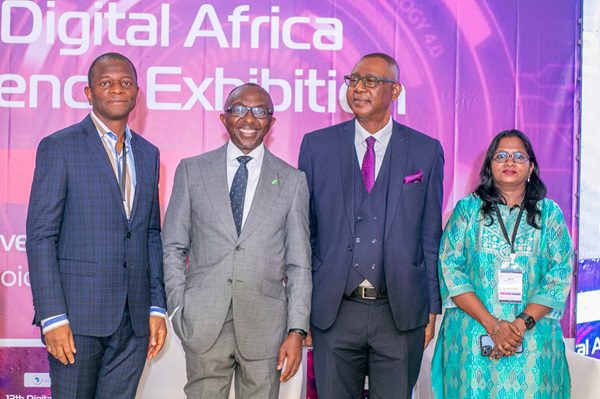– Advertisement –
– Advertisement –
– Advertisement –
– Advertisement –

The chief executive officer (CEO) of the Ministry of Finance Incorporated (MOFI), Dr. Armstrong Takang has urged African nations to claim their rightful place in the global artificial intelligence landscape, insisting that the continent must move from being a rule-taker to a rule-maker in the unfolding AI revolution.
Takang made the call in Abuja at the 13th Digital Africa Conference and Exhibition themed “Sovereign Intelligence: Africa’s Voice in the Global AI Order.”
He said Africa stands at a defining moment where the choices made in the next two years will determine its technological and economic trajectory for decades to come.
“This is not about catching up. It is about deciding whether Africa will be a rule-maker or a rule-taker in the AI age,” he declared.
According to him, AI is already reshaping global power dynamics, with projections showing that Africa’s AI market – currently valued at $4.5 billion – is expected to grow to $16.5 billion by 2030, potentially creating 230 million digital jobs and adding up to six per cent to the continent’s GDP.
Takang described this as a transformative opportunity to redefine Africa’s position in the global digital economy, adding that the time has come for the continent to take ownership of its data, infrastructure and technological destiny.
Presenting a paper titled “Sovereign Intelligence: Africa’s Voice in the Global AI Order,” Takang defined sovereign intelligence as Africa’s right to self-determination in how AI is developed, deployed and governed.
He explained that true AI sovereignty rests on four core pillars — infrastructure sovereignty, data sovereignty, algorithmic sovereignty and governance sovereignty — designed to ensure that the continent’s digital future reflects African values, languages and priorities.
“Sovereign intelligence is about participation on our own terms, not isolation from the world,” he said.

Takang commended the African Union for adopting the Continental AI Strategy in July 2024 and the Africa Declaration on AI signed by 52 nations in April 2025, describing them as a unified blueprint for ethical AI development and regional cooperation.
Backed by a $60 billion continental AI development fund, the initiatives aim to build data centres, innovation hubs and digital skills pipelines across Africa by 2030.
He noted that Nigeria’s National AI Strategy launched in 2024 and updated in 2025 aligns with this continental vision and positions the country as a leader in ethical and inclusive AI innovation.
Despite Africa’s promise, Takang warned that the continent accounts for only about one to one and a half per cent of global AI investment, a situation that could widen the digital divide if left unaddressed. He stressed the urgent need to tackle challenges such as unreliable power supply, limited broadband access and a growing skills gap, with 41 per cent of African AI researchers currently working abroad.
He called for targeted investments in digital infrastructure, education reforms to integrate AI literacy, and partnerships that promote gender inclusion and youth participation in technology.
The MOFI boss identified Africa’s financial sector as a launch pad for AI-driven transformation, pointing to Nigeria’s vibrant fintech ecosystem — home to unicorns such as Flutterwave, OPay and Interswitch — as proof of the continent’s capacity for scalable innovation.
He urged financial institutions to lead in responsible AI adoption, transparency and data governance while using technology to deepen financial inclusion and economic participation.
Takang emphasised the need for a multi-stakeholder approach to building Africa’s AI future. He urged governments to align national AI policies with continental frameworks, private sector players to invest in scalable African solutions, development partners to support local capacity-building and infrastructure, and financial institutions to deploy AI in ways that expand inclusion and innovation.
“The nations that lead in AI will shape humanity’s future,” he stated. “Africa’s voice must not just be heard — it must be influential.”
He concluded with a rallying call for continental unity and collaboration, stressing that Africa must transition from being a consumer of technology to a creator and global leader in AI.
“The question is not whether Africa will participate in the AI revolution, but how it will lead it,” he said.
In his opening remarks, the chairman of Digital Africa Global Consult, Dr. Evans Woherem described the conference as a rallying point for Africa’s technological independence.
He lamented that the continent has for too long been a consumer of technologies created elsewhere, with its data, languages and experts often excluded from global decision-making.
“Sovereign intelligence is not just a theme; it is a call to action,” he said. “It is about Africa taking control of its digital future, setting its own rules and ensuring that technology works for us — not just for others.”

Woherem said the Digital Africa 2025 vision seeks to amplify African voices in global tech governance, promote homegrown innovation and strengthen digital infrastructure and human capital across the continent.
Delivering her welcome address, general manager of Digital Africa, Nneoma Ofodile said the conference has for over a decade provided a platform for shaping Africa’s digital transformation — from broadband and ICT policy to frontier technologies such as AI and blockchain.
“Sovereign intelligence speaks to our right and responsibility to define how AI reflects our realities, values, ethics and aspirations,” she said.
Ofodile highlighted the Nigeria Data Challenge, a flagship initiative of Digital Africa in partnership with the Nigeria Data Protection Commission and ActionAid Nigeria, aimed at nurturing young Nigerians to understand data ethics, privacy and digital responsibility.
She urged participants to move from conversation to implementation, turning discussions into concrete actions that build a digitally empowered Africa.
Delivering a goodwill message, the CEO of VDT Communications Limited, Engr. Biodun Omoniyi, emphasised that Africa’s digital sovereignty begins with strong infrastructure supported by broadband connectivity, resilient networks and smart technologies.
“Sovereignty today is not just about physical borders — it is about control over our data, our digital infrastructure and our innovation pathways,” he said.
He noted that VDT’s investments in digital infrastructure have enabled Nigerian businesses and institutions to thrive, adding that the continent must also prioritise talent development and local innovation to achieve true technological independence.
“Africa’s voice in the global digital order must be clear, united and forward-looking,” Omoniyi said. “We have the creativity and resilience to not just participate but to lead and inspire the digital future.”

Related
– Advertisement –








